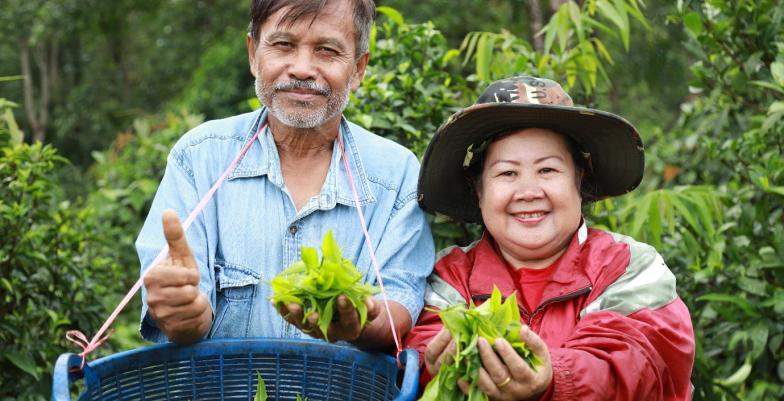RELATIONS WITH THE EU
The European Union and The African Union - Green transition and energy access
This new strategy and these partnerships are in line with the common priorities set by the EU and the African Union at the 2017 Summit in Abidjan. It takes inspiration notably from the very fruitful discussions between the European Commission and the African Union Commission, which took place in Addis Ababa on 27 February 2020 and reflects the EU’s proposals for the ongoing exchanges with African partners in view of defining a joint partnership agenda. EU-Africa engagement will continue at bilateral, regional and continental level.
Green transition
The fight against climate change and environmental degradation is this generation’s defining task. African countries are particularly vulnerable to climate change as it risks jeopardising ongoing progress on sustainable development. Europe and Africa are allies in developing a green growth model, including circular and blue economies; combatting climate change; protecting biodiversity and natural resources; ensuring food security and rural development as well as access to sustainable energy and developing transport solutions. All these joint priorities can underpin Africa’s and Europe’s economic growth. Progress can only be achieved by working together on the basis of shared global commitments, such as the 2030 Agenda for Sustainable Development and the Paris Agreement on Climate Change and Agenda 2063.
Ensuring a joint EU-AU Green transition means working together towards a low-carbon, resource efficient and climate-resilient future in line with the Paris Agreement and protecting the environment through circular economy approaches and the protection and restoration of natural capital, biodiversity and ecosystems such as forests, water and marine environment. It also means ensuring and developing safe and sustainable agri-food systems, blue economy, sustainable fisheries and better ocean governance. The EU addresses these priorities through its European Green Deal, complemented by the EU Circular Economy Action Plan, the EU Biodiversity Strategy 2030, the EU Farm to Fork Strategy and others. The AU guiding continental flagship is Africa’ Agenda 2063, with the CAADP and Malabo Declaration, the AU SPS Policy Framework, the AU Wildlife Strategy, the AU Sustainable Forest Management Framework, the AU Blue Economy Strategy and others contributing to it.
Agriculture:
The EU and the AU have been holding regular Agriculture Ministerial Conferences since 2016. The first took place in 2016 in the Netherlands, addressing the topic of ‘Investing in a Food Secure Future’. The second and third AUEU Agriculture Ministerial Conferences took place in Rome in 2017 and 2019, addressing respectively the topics of ‘Making Sustainable Agriculture a future for youth in Africa’ and ‘Promoting sustainable regional agri-food value chains’. The 2019 Ministerial Conference concluded with a joint AUEU Political Declaration on Agriculture and related Action Agenda. The latter is based on the recommendations of the Task Force Rural Africa, established under the ‘Africa-Europe Alliance for sustainable investment and jobs’, and in line with CAADP, the Comprehensive Africa Agriculture Development Programme and Malabo Declaration. The 4th AUEU Agriculture Ministerial Conference took place on 22 June 2021, addressing investments in agriculture, research and innovation, digital agriculture and regional trade integration and taking stock of the progress since 2019. The outcomes will feed into the upcoming AU-EU Ministerial Conference and EU-AU Summit scheduled for later in 2021 and 2022 respectively.
Under the joint AUEU Rural Action Agenda, the EU is supporting a number of actions, such as:
- PANAP (Pan-African Network for economic Analysis of Policies).
- AU SPS Policy Framework and the operationalisation of Annex 7 of the Protocol on Trade in Goods of the AfCFTA.
- AU GI (Geographical Indications) Strategy.
- Agri-business platforms.
- African-European Farmers’ exchanges.
- EU-AU VET schools mobility scheme on agriculture/agribusiness.
- EU-AU Food Nutrition Security and Sustainable Agriculture partnership (FNSSA).
- DeSIRA initiative (Development of Smart Innovation through Research in Agriculture)
Environment:
The EU and AU environmental priorities are aligned and well-reflected in respective continental strategies and flagships.
The EU, with its extensive experience in developing and implementing the first and second EU Circular Economy Action Plan, is supporting the AU in developing its AU Circular Economy Action Plan, addressing priority sectors for circularity in Africa, aligned with the EU ones - food systems, packaging, built environment, electronics and fashion and textiles. These were identified by the African Circular Economy Alliance, who together with the African Circular Economy Network, the AfDB and other stakeholders, promote and support the transition to a circular economy in Africa.
The EU Biodiversity Strategy 2030 reflects well the priorities of the AU continental flagships such as the AU Wildlife Strategy and the AU Sustainable Forest Management Framework. Protecting and restoring biodiversity, including wetlands, peatlands and coastal ecosystems, or sustainably managing marine areas, forests, grasslands and agricultural soils, ensuring natural capital accounting and developing nature-based solutions, but also combatting the illegal exploitation and trade of wildlife and are among the joint EU-AU priorities. These should be well reflected in an ambitious post-2020 Global Biodiversity Framework. Biodiversity and climate are the two sides of the same planetary emergency. The EU is supporting the Leaders’ Pledge for Nature and the High Ambition Coalition for Nature and People, as well as the Global Alliance on Circular Economy and Resource Efficiency (GACERE), and invites the AU to join these global initiatives contributing to the implementation of the Agenda 2030 and the SDGs.
Energy transition
Sub-Saharan Africa remains the world’s region with the largest “access to energy” deficit: about 600 million people are lacking access to electricity and 850 million do not have access to clean cooking facilities, despite the very high and largely underexploited potential of Africa’s renewable energy sources (wind, solar, hydropower, etc.).
Address the energy needs of Africa’s growing population means putting the focus on resilient infrastructure, cleaner, more sustainable and secure energy access, maximising renewable energy sources, energy transition and efficiency across all value chains, as well as regional integration for energy security.
A number of actions are contributing to the implementation of the AU-EU partnership on energy:
- For the period 2014-2020, EUR 3 billion have been allocated for sustainable energy specifically targeting Africa, focusing efforts on three drivers: 1) promoting political ownership and partnerships; 2) improving governance and reforms in the energy sector; 3) boosting investments through innovative financial instruments. Since 2017, the main vehicle to support investments in the energy sector is the EU’s External Investment Plan (EIP) covering countries in Africa and the EU Neighbourhood region.
- The Africa-Europe Alliance for sustainable investments and jobs triggered the establishment of the “High Level Platform for Sustainable Energy Investments” focussing on promoting private investments in Africa's energy sector.
- Since 2015, the EU Technical Assistance for the EU is supporting the African Union in the harmonisation of its electricity market, which culminated in 2021 by the launch of the African Single Electricity Market (AfSEM). The EU is also supporting the AU in the elaboration of a Continental Power Systems Master Plan (CMP).
- In addition, the EU is also supporting a number of African Union initiatives and flagships, such as the Programme for Infrastructure Development (PIDA) and the AREI (Africa Renewable Energy Initiative).
- Finally, the 14 year old Africa-EU Energy Partnership (AEEP) is one of the eight strategic partnerships that comprised the Africa-EU Joint Strategy in 2007.








